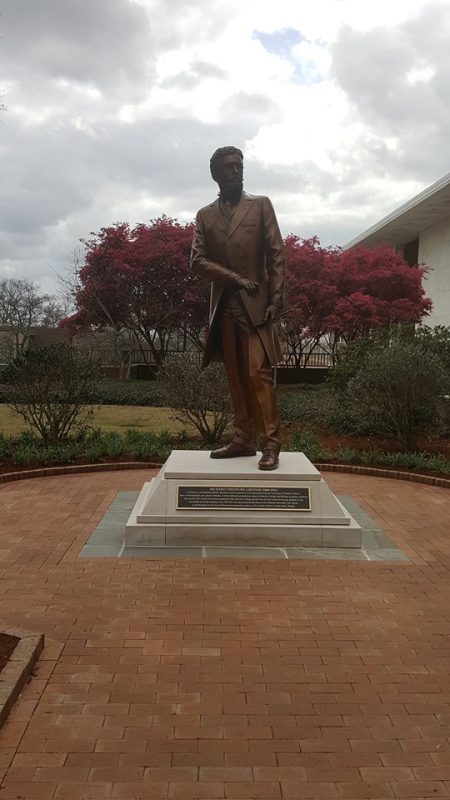Yesterday the University of South Carolina unveiled a statue to Richard T. Greener. The first African American professor in the university’s history, Greener’s story is an extraordinary one of continued triumph and struggle in the face of nineteenth century racism. Tim Lacy has already written about Greener, using Greener’s life to think about how we collect sources on previously barely known stories from history. Here, I’d like to think about how Greener’s life allows us to think about different elements of intellectual history.
Richard Greener’s life is, of course, an intriguing template through which to understand African American intellectual  history. The recent biography just released about his life, Uncompromising Activist, shows how Greener’s intellect was often not fully appreciated in a society imbued with white supremacy. Still, Greener was able to obtain some opportunities never before offered to African Americans—he was the first black graduate of Harvard, and as mentioned before the first black professor at the campus of the University of South Carolina. His debates with Frederick Douglass over emigration from the south to the west for African Americans, and his long career of campaigning for the Republican Party and African American civil rights, can also serve as starting places for thinking about bigger conceptual questions of African American intellectual history during and immediately following Reconstruction.
history. The recent biography just released about his life, Uncompromising Activist, shows how Greener’s intellect was often not fully appreciated in a society imbued with white supremacy. Still, Greener was able to obtain some opportunities never before offered to African Americans—he was the first black graduate of Harvard, and as mentioned before the first black professor at the campus of the University of South Carolina. His debates with Frederick Douglass over emigration from the south to the west for African Americans, and his long career of campaigning for the Republican Party and African American civil rights, can also serve as starting places for thinking about bigger conceptual questions of African American intellectual history during and immediately following Reconstruction.
Southern intellectual history is another area where Greener’s life and legacy can be part of a larger narrative. The University of South Carolina was the only school in the Deep South to be desegregated after the American Civil War. The state’s experiment with genuine, biracial democracy under the Constitution of 1868 is something that casts a long shadow over post-Reconstruction intellectual history. When historians of the Dunning School criticized Reconstruction and “black rule,” no doubt they were thinking of South Carolina—the only state to have a majority black legislature during Reconstruction. Birth of a Nation’s Reconstruction era scenes are set in South Carolina. For many, South Carolina became a phrase to describe excessive democracy that dared to give African Americans rights.
Finally, both Greener’s life and the decision to dedicate a statute to him on the grounds of the University of South Carolina should be occasion to think about memory in American society. Greener himself served as secretary of the Grant Monument Association, dedicated to Ulysses S. Grant. The fact that USC is putting up statues to Greener—not to mention plaques dedicated to the slaves who worked on South Carolina College’s campus in the early nineteenth century—is a model of public memorialization that may become more popular as the fights over already standing monuments to Confederate and Jim Crow-era leaders continue.
Finally, a quick note: As of today, I’ll be blogging every Thursday. Tim Lacy will now begin blogging on Sundays. So look forward to more enlightening—or, more than likely mediocre—takes on intellectual history from me on Thursday afternoons.

One Thought on this Post
S-USIH Comment Policy
We ask that those who participate in the discussions generated in the Comments section do so with the same decorum as they would in any other academic setting or context. Since the USIH bloggers write under our real names, we would prefer that our commenters also identify themselves by their real name. As our primary goal is to stimulate and engage in fruitful and productive discussion, ad hominem attacks (personal or professional), unnecessary insults, and/or mean-spiritedness have no place in the USIH Blog’s Comments section. Therefore, we reserve the right to remove any comments that contain any of the above and/or are not intended to further the discussion of the topic of the post. We welcome suggestions for corrections to any of our posts. As the official blog of the Society of US Intellectual History, we hope to foster a diverse community of scholars and readers who engage with one another in discussions of US intellectual history, broadly understood.
Love your #USIH takes, Robert! You’re always thinking about interesting topics and asking us to remember apt issues. Keep up the good work! – TL